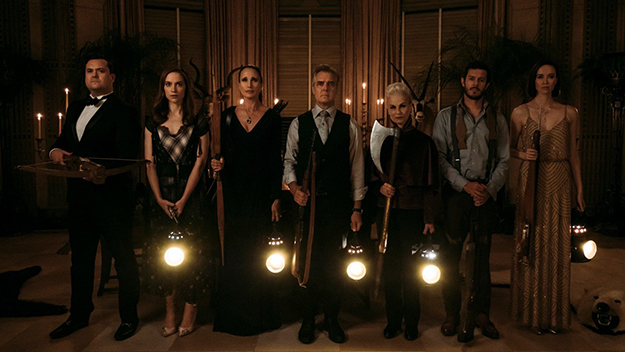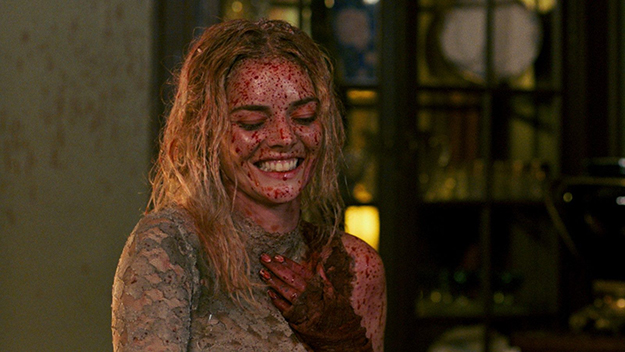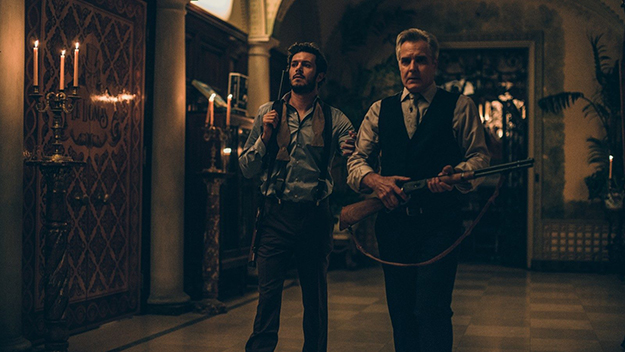Deep Focus: Ready or Not

Images from Ready or Not (Matt Bettinelli-Olpin and Tyler Gillett, 2019)
“Get the Guests,” “Humiliate the Host,“ “Hump the Hostess,” “Bringing Up Baby,” “Snap the Dragon,” and “Killing the Kid”—the makers of the killingly clumsy horror comedy Ready or Not aim to take all those games from Who’s Afraid of Virginia Woolf?, swap sexual for homicidal content, and subsume them into a bout of “Hide and Seek” played for blood and wedded to Satanic ritual.
Traditionally, the filthy rich Le Domas clan ushers a new adult into the family by staging a wedding at their ancestral estate. At midnight the unwitting bride or groom draws a card with a game title written on its surface, from a weathered mystical box. If she or he pulls the dreaded “Hide or Seek” card, only the neophyte hides—to become the target for the family’s bow and arrows, crossbow, battle axe, pistols, and rifles. It’s part of a deal that their devilish benefactor, Monsieur Le Bail, struck with the founder of the Le Domas gaming and sporting empire. Le Bail also included an “eradication clause.” If the blood relatives don’t kill off their victim by dawn, they all go down in flames. Weapons are restricted to those used in the great-grandfather’s time—unless the one-percenters get desperate.
Is Le Doma taken from doma, the Spanish feminine noun for “taming” or “breaking in?” Or is it, perhaps, a droll play on DOMA: the Defense of Marriage Act? The movie is so ragged and silly that we can read any damn thing into it, which is one of its slender charms. If we enter the theater in a sufficiently grumpy mood, we can get off, for a while, on the cartoonish burlesque of decadent wealth and in-grown customs. Tony Le Domas (Henry Czerny), the current head of the family, swiftly devolves from authority figure into hapless whiner. He makes physical contact with his competent, gracious, super-pragmatic wife Becky (Andie MacDowell) as rarely as Donald does with Melania. His loyal offspring are disasters: Emilie (Melanie Scrofano), a jumpy, drug-addled ne’er-do-well married to overgrown frat boy Fitch Bradley (Kristian Bruun); Daniel (Adam Brody), an extreme self-loather with a soulless, grasping wife ironically named “Charity” (Elyse Levesque). Only semi-estranged son Alex (Max O’Brien) has potential. The family regards him as the Chosen One because, as a lad, at the previous game of Hide and Seek, he had a spectral vision of Le Bail. But we can see from the start that he’s pitifully weak and conflicted.

Alex’s bride, the unironically named Grace (Samara Weaving), grew up a foster child and yearns for roots. In the hands of the directing partnership of Matt Bettinelli-Olpin and Tyler Gillet (who along with executive producer Chad Villela are known as “Radio Silence’) and screenwriters Guy Busick and R. Christopher Murphy, the resulting premise is as unspeakably whimsical as a grown-up, R-rated Annie meeting the Addams Family. We half expect Grace to sing “The fucking sun’ll come out tomorrow!” Grace loves Alex and thinks she can do anything to please his parents and siblings—until the game begins. As a performer, Weaving’s got enough gumption, range, and perceptiveness to pull us through the shenanigans, but it’s a long haul.
The movie pitches its blood-and-guts flakiness too absurdly high. There’s nowhere to go but down once we see and hear Nicky Guadagni, as Aunt Helene, glare and hiss her way through the nuptials, like a troll in a white fright wig. I did like the idea of battle-axe Helene wielding an actual battle-axe, but Ready or Not lacks the high-style or precision to elevate its setups beyond lowdown shocks and yocks. It’s initially funny to see the female house staff resemble the black-clad models in Robert Palmer’s “Addicted to Love” video, but the filmmakers are murderously hard on domestic servants. The female servants in Ready Or Not are disposable butts of the black comedy, while the head butler, Stevens (John Ralston), who at least rises to the level of caricature, is so pathetically in love with aristocratic affectation that he uses Tchaikovsky’s 1812 Overture as his battle anthem. It’s his idea of class—and his tragic flaw. The facetious music centers on greatest hits like Beethoven’s 9th and Elvis’s “Love Me Tender.”
The movie echoes Jordan Peele’s family-secret social satire Get Out and the broad-stroke political parables of the Purge series. It’s lucky to debut after the cancelled opening of The Hunt, a fable of liberal elites kidnapping working-class conservatives and forcing them to play The Most Dangerous Game. (Obviously intended to satirize both sides, The Hunt was deemed un-releasable after the mass killings in Dayton and El Paso and Donald Trump’s rabble-rousing tweet-storm against it. )

“The rich really are different,” Daniel mutters, referencing F. Scott Fitzgerald. True to form, a wealthy neighbor speeding through the night in a sleek car greets Grace’s cries for help with “Get off the road!” In a shout-out to The Witches of Eastwick, Father Tony recalls another Luciferian family, the Van Horns. But the film does little to suggest a vast Satanist conspiracy of networkers and enablers. The plot unravels on the plane of interpersonal betrayal. At heart it’s just about Grace accusing Alex of a big lie of omission: “You said your family was fucked-up. You didn’t say psycho-killers.”
All these flaws and limitations might be forgiven if Radio Silence delivered a minimum of finesse. But even the exploding body effects lack the oomph of Cronenberg’s or De Palma’s. Despite four eyes on the camera—six, counting cinematographer Brett Jutkiewicz—not one puts the camera in the right place for a tingling frisson or coup de grace. The movie is a Gothic anti-romance, a gore-and-sorcery lampoon of movies like Hitchcock’s Rebecca. Why couldn’t Radio Silence have elevated their style the way Mel Brooks did when he took on James Whale’s Frankenstein? These filmmakers provide Chez Le Domas with an apt aged-wood , flickering candle gestalt. But apart from identifying a servants’ corridor, they don’t do much to cue us into the palace layout. Grace’s wrong turns generate simple jolts rather than suspense. Antique game boxes aren’t enough to conjure a specific atmosphere, and when everything goes to blazes, the filmmakers flub their chance to pay homage to Hitchcock’s Manderley.
Radio Silence chalked up millions of views with online shorts and interactive adventures, then segued into horror features with the mock found-footage feature Devil’s Due (2014) and the anthology movie Southbound (2015). Were they ready to take on a more ambitious fusion of genres? I say, “Not.” When it comes to sick-joke debauchery with a catchphrase title, I prefer Adam Wingard’s 2013 cult film, You’re Next.
Michael Sragow is a contributing editor to Film Comment and writes its Deep Focus column. He is a member of the National Society of Film Critics and the Los Angeles Film Critics Association.







